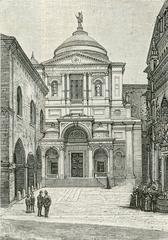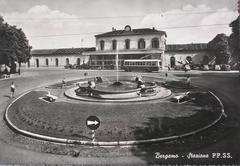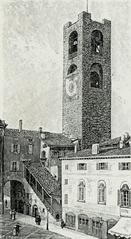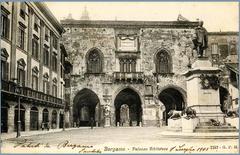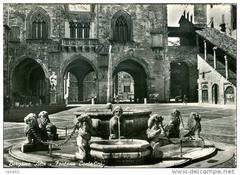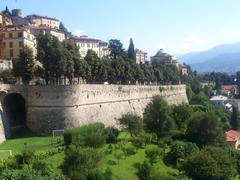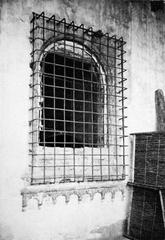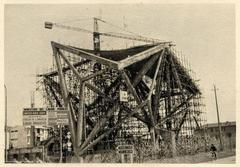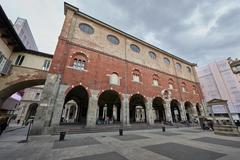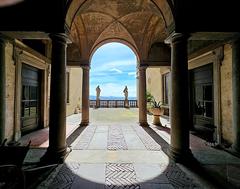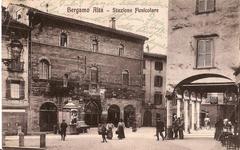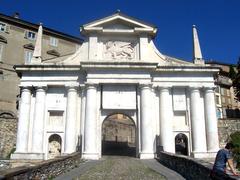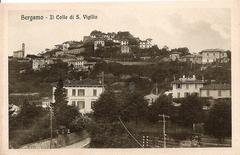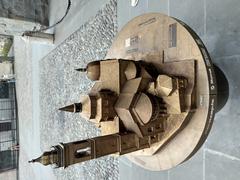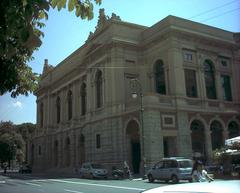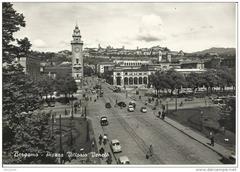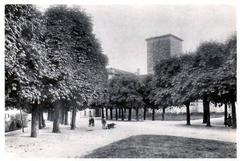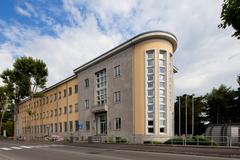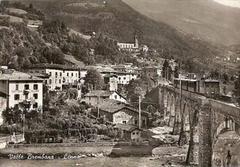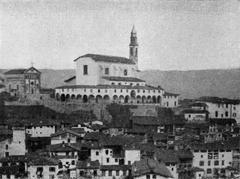Sant’Alessandro in Colonna: Visiting Hours, Ticket Information, and Historical Significance in Bergamo
Date: 04/07/2025
Introduction
Sant’Alessandro in Colonna, located in the heart of Bergamo, Italy, is a landmark of religious, civic, and artistic heritage. Dedicated to Saint Alexander of Bergamo, a Roman centurion and martyr, this basilica is both a place of worship and a treasure trove of art and architecture, reflecting the city’s spiritual identity and centuries of history (catholicshrinebasilica.com; visitbergamo.net). The site is renowned for its evolving architecture, from early medieval roots through Renaissance, Baroque, and Neoclassical transformations, and for the imposing Roman column believed to mark the site of the saint’s martyrdom.
This guide provides a comprehensive overview of the basilica’s history, key architectural features, practical visitor information—including hours, ticketing, and accessibility—and recommendations for nearby attractions. Whether you are drawn by faith, art, or cultural curiosity, Sant’Alessandro in Colonna offers a unique perspective on Bergamo’s rich legacy (it.wikipedia.org; lombardiabeniculturali.it).
Table of Contents
- Historical Background and Foundation
- Architectural Evolution
- Artistic Heritage
- Religious and Civic Significance
- Visiting Hours, Tickets, and Accessibility
- Location, Contact, and Facilities
- Guided Tours and Insider Tips
- Nearby Attractions
- Annual Events and Highlights
- Frequently Asked Questions (FAQ)
- Plan Your Visit
- References
Historical Background and Foundation
Sant’Alessandro in Colonna stands on a site deeply associated with Saint Alexander of Bergamo, the city’s patron who was martyred in 303 AD during the Diocletianic persecutions (catholicshrinebasilica.com). Tradition holds that the church’s Roman column marks the precise location of Alexander’s execution. A church likely existed on this site as early as the 6th century, possibly built over a pagan temple, although the first recorded mention dates to 1133, when it was referred to as “ad columna” for its ancient columns (lombardiabeniculturali.it; it.wikipedia.org).
The basilica has been a focal point for Christian worship and veneration for centuries, with its iconic column serving as a symbol of both faith and the enduring connection between Bergamo’s past and present (visitbergamo.net).
Architectural Evolution
Medieval, Renaissance, and Baroque Transformations
The church’s structure has evolved significantly:
- Medieval Period: After a partial collapse in 1447, the basilica was rebuilt and consecrated in 1474, establishing much of its current layout (catholicshrinebasilica.com).
- Baroque and Neoclassical Era: Between the 17th and 18th centuries, major restorations gave the basilica its present grandeur. The Neoclassical marble façade, completed in the late 1700s, is distinguished by its elegant pilasters, grand portal, and statuary (lombardiabeniculturali.it). The dome and expanded nave enhance the sense of spaciousness and light.
- Bell Tower: Initiated in 1842 and finished in 1904, the imposing bell tower rises in six levels and completes the basilica’s striking silhouette.
The Roman Column
A 10-meter Roman column, reassembled in 1618, stands in the church’s forecourt and remains the sole survivor of a 4th-century cathedral once dedicated to Saint Alexander. It is a powerful visual and historical symbol, protected by a neoclassical structure (visitbergamo.net; itinerari.bergamo.it).
Artistic Heritage
The basilica’s interior is a showcase of Bergamasque religious art, with a single nave flanked by chapels and adorned with masterpieces by renowned artists:
- Lorenzo Lotto: “Compianto su Cristo morto,” a rare Renaissance tempera on canvas.
- Girolamo Romanino: “Assunzione della Vergine.”
- Gian Paolo Cavagna: “Santa Grata che raccoglie la testa di Sant’Alessandro.”
- Enea Salmeggia: “Martirio di Sant’Alessandro.”
- Francesco Zucco: Cycle of paintings illustrating the saint’s life, including “Sant’Alessandro si presenta ad un Vescovo” (1627).
- Other Works: Paintings by Leandro and Giovanni Battista Bassano, Alessandro Bonvicino (Il Moretto), and Antonio Cifrondi, among others (bestofbergamo.com; visitclusone.it).
The elegant chapels, coffered vault, and high altar—housing the saint’s relics—create an immersive spiritual and artistic environment (lombardiabeniculturali.it; wikipedia.org).
Religious and Civic Significance
Sant’Alessandro in Colonna has been the heart of Bergamo’s spiritual life for centuries. It continues to serve as a parish church and a destination for pilgrims, particularly during the Feast of Saint Alexander on August 26, which features religious ceremonies, processions, and communal celebrations (catholicshrinebasilica.com; santalessandroincolonna.it). The basilica remains a vibrant hub for worship, community events, and cultural gatherings.
Visiting Hours, Tickets, and Accessibility
- Opening Hours: Daily, 8:00 AM – 7:00 PM (visitclusone.it)
- Admission: Free. Donations are welcomed to support preservation.
- Guided Tours: Available by prior arrangement via the parish office or through local tourism services (bergamo.tours).
- Accessibility: Wheelchair access is provided at the main entrance and within the nave. Some chapels may have limited access due to historic architecture. Assistance is available upon request.
- Mass Times: 08:45 AM and 10:30 AM daily; additional services on feast days (orarisantemesseoggi.it).
Location, Contact, and Facilities
- Address: Via Sant’Alessandro 35, 24122 Bergamo, Italy
- Parish Office: +39 035 248022 | [email protected]
- Official Parish Website
- Navigation Map: Digital Map
- Public Restrooms: Not available inside; facilities nearby
- Oratorio dell’Immacolata: Via Giuseppe Greppi, 6, open daily 3:00 PM–7:00 PM
Guided Tours and Insider Tips
- Tours: Book in advance for in-depth experiences with local guides, focusing on religious art, architecture, and history.
- Photography: Permitted without flash; tripods and professional equipment require permission. Best lighting is during daylight. Respect worshippers and ceremonies.
- Dress Code: Modest attire (shoulders and knees covered) is recommended.
Nearby Attractions
- Città Alta: Explore the historic Upper Town, including Piazza Vecchia, Basilica di Santa Maria Maggiore, and the Colleoni Chapel.
- Donizetti Theatre & Venetian Walls: UNESCO World Heritage Sites within walking distance.
- Art Galleries: Accademia Carrara and other museums are easily accessible.
- Cafés and Shops: Numerous options nearby for refreshments and local products.
Annual Events and Highlights
- Feast of Saint Alexander (August 26): The city’s patronal festival, featuring processions starting at the Roman column, special liturgies, and cultural events (visitbergamo.net).
- Concerts and Exhibitions: Organized throughout the year, enhancing the basilica’s cultural role.
Frequently Asked Questions (FAQ)
Q: What are the visiting hours of Sant’Alessandro in Colonna?
A: Daily, 8:00 AM – 7:00 PM. Hours may vary on holidays or special events.
Q: Is there an admission fee?
A: No, entry is free. Donations are appreciated.
Q: Are guided tours available?
A: Yes, through the parish office or local guides. Advance booking is advised.
Q: Is the basilica accessible for visitors with limited mobility?
A: Yes, with some limitations in historic areas. Assistance is available.
Q: Can I take photographs?
A: Yes, without flash. Professional equipment requires prior approval.
Plan Your Visit
To get the most out of your visit, check for updated schedules on the official parish website, book a guided tour, and utilize the Audiala app for audio-guided experiences. For events or festival dates, consult parish bulletins or local tourism offices (visitclusone.it).
References
- Catholic Shrine Basilica
- Evendo
- Visit Bergamo
- Sant’Alessandro in Colonna Parish Website
- Lombardia Beni Culturali
- Wikipedia: Sant’Alessandro in Colonna
- Wikipedia Italia: Basilica di Sant’Alessandro in Colonna
- Diocese of Bergamo
- Visit Clusone
